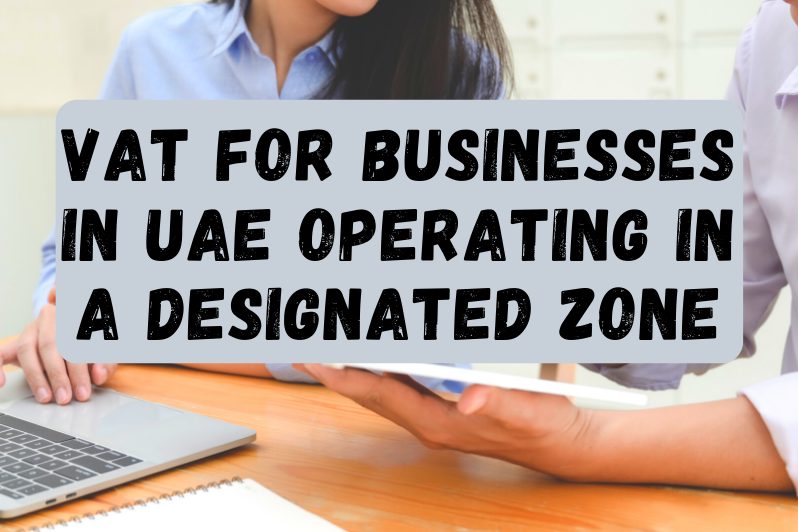Businesses in the UAE are experiencing material exposures from penalties and tax assessments due to incorrect application of regulations for designated zones in UAE, either due to the supplies or from the VAT treatment that was applied by suppliers or vendors.
Many businesses struggle in the application of designated zone rules to their daily operations. They may be required in making an adjustment to taxable supplies that were treated as VAT-exempt and charge five percent VAT to customers and clients. The corrections attract significant fines and penalties that can only increase over time. Violations to VAT regulations can also bloat the original tax due to businesses of up to 350%.
If you’re a business that’s involved in a supply chain that includes a movement of goods between, from, or within a designated zone, there’s the risk that tax rules are applied incorrectly in the organization. Some examples are as follows:
- Taxable supplies where Importer of Record isn’t the owner of products during the import e.g. when the customer has imported products under its import license prior to a legal title transfer;
- Supplies made under DDP or Delivered Duty Paid incoterm or any similar arrangement that involves product delivery to UAE mainland premises;
- Supplies where products are brought into the designated zone using an import permit that authorizes an import into a UAE free zone or a different designated zone;
- Taxable supplies wherein customer plans on consuming the products for commercial or personal use;
- Taxable supplies of goods wherein the vendor isn’t aware of purposes for which customers will put the goods to use;
- Supplies that are in relation or involve real estate that is situated within a designated zone
Where supply chains are involving goods that are subject to UAE excise tax, more complications can arise.
List of UAE Designated Zones
Abu Dhabi Designated Zones
- Abu Dhabi Airport FZ
- Khalifa Port Free Trade Zone
- Khalifa Industrial Zone
- Al Butain Int’l Airport Free Zone
Dubai Designated Zones
- Dubai Textile City
- Dubai Cars & Automotive Zone
- Jebel Ali (North-South) FZ
- Dubai Aviation City
- Int’l Humanitarian City
- Dubai Airport FZ
Sharjah Designated Zones
- Sharjah Airport Int’l Free Zone
- Hamriyah Free Zone
Umm al Quwain Designated Zones
- UAQ Free Trade Zone situated in Ahmed Bin Rashid Pt.
- UAE Free Trade Zone situated in Sheikh Mohammed Bin Zayed Rd.
Ras al Khaimah Designated Zones
- Ras al Khaimah Free Trade Zone
- Ras al Khaimah Maritime City FZ
- Al Hamra Industrial Free Zone
- Al Ghail Industrial Free Zone
- Al Hulaila Industrial Free Zone
Fujairah Designated Zones
- Fujairah Free Zone
- Fujairah Oil Industry Free Zone
Ajman Designated Zones
- Ajman Free Zone
Which free zones are to be considered as UAE designated zones?
A free zone is a designated zone if it is specified by the UAE Cabinet as a designated zone in the UAE and if it has fencing, custom controls, and security controls in place.
The transfer of goods to a designated zone with the goods’ source to be outside of the UAE, VAT won’t be applicable. Transfer of goods to a designated zone with the goods’ source to be from UAE mainland, the supplies will be treated to be local supplies. They won’t be considered as export of goods and will have the standard rate of VAT, which is currently at five percent.
As for transfers of goods between UAE designated zones, the transfer of the goods will be treated to be outside VAT scope and subject to previous conditions that are being met. Movement of goods to the mainland from designated zones will also be considered as out of scope for the supplier that’s located in a designated zone. This will be considered as goods import for the buyer in UAE mainland. The buyer in the mainland will be booking VAT liability on the basis of the Reverse Charge Mechanism.
Goods that are located within a UAE designated zone whose owner hasn’t paid VAT is to be treated as UAE import where goods are consumed by the owner unless they’re used to produce goods located in another designated zone.
Supplies of goods between or within designated zones in UAE
The authority expects written statements from goods recipients that goods won’t be consumed to treat the transactions as outside VAT scope.
Where goods are being moved from one designated zone to another, tax authorities will require the owner of goods to present a financial guarantee with the VAT payment which the person will liable for if the conditions with the movement of goods won’t be met.
Regulated Tax Agents in UAE
Most businesses in the country find it too confusing to deal with VAT accounting and the constantly changing tax regulations. If you are finding it difficult to deal with tax matters on your own, we suggest you talk to our regulated tax agents here at VAT Registration UAE. We would love to discuss how our experts can help in addressing all of your needs, requirements, and concerns. Call us today!

